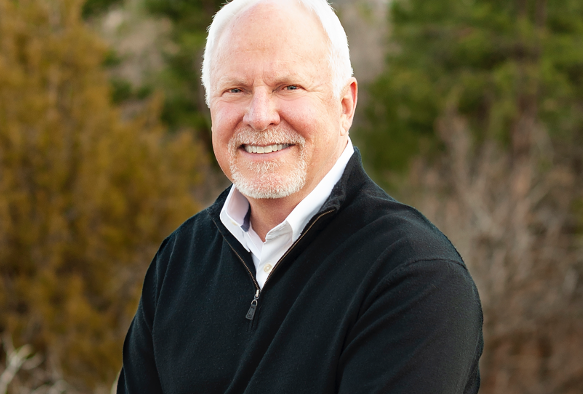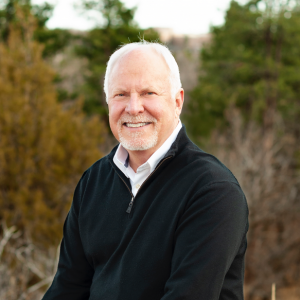Excellence In Giving Helps Donors Fulfill Passions, Find Joy

Al Mueller spent two decades working with the investment firms Morgan Stanley and UBS, helping wealthy clients—mostly corporate CEOs with a personal net worth of $100 million or more—grow even wealthier.

He was successful at the work, which helped him grow wealthier, too. But somehow, it wasn’t enough.
“I was asking myself, if I help my client make another $5 million does it really change his life?” he recalls. “I thought, if I could help a person give away $5 million, that could really change some lives!” he said. “But who’s doing that?”
In 2000, he was on a plane flying from Phoenix to New York when he silently asked God to help him write a new purpose statement that would enable him to find deeper meaning in his work and life.
His life plan soon emerged: “To motivate Christians to give significantly and sacrificially, with maximum efficiency, to kingdom activities.”
In 2002, that plan gave birth to Excellence In Giving, a 16-employee philanthropic advisory service based in Colorado Springs that last year “deployed” $89 million dollars to high impact projects and ministries.
Deployed means actual checks written to operating nonprofits, not funds parked in Donor Advised Funds, where donations often linger for years before going to the intended recipients, even though donors receive an immediate IRS deduction.
“When our clients put money in a DAF or their private foundations, we don’t count that as ‘deployed,’” Mueller said. “Gift means out the door and into the hands of an operating nonprofit.”
Access to MinistryWatch content is free. However, we hope you will support our work with your prayers and financial gifts. To make a donation, click here.
Mueller expresses his criticism of DAF’s in theological terms: “Uncle Sam says you made a gift when you put money in a DAF, but I’m not sure God would say you made a gift” until it goes to a nonprofit that puts it to use.
EIG’s $89 million in deployed gifts came from 60 fee-paying clients—including Christians, Jews, followers of other faiths, and a few non-believers—who wrote checks to 981 nonprofits in 2020, up from $68 million in 2019. Since 2002, EIG clients have given away upwards of $400 million.
Money has flowed to religious and secular groups. “Our clients retain full control of which organizations they support,” Mueller says. “We’re vehicle agnostic.”
Recent gifts helped Africa Mission Health Care provide oxygen systems for mission hospitals and convert an honors program at the University of Kentucky into an honors college.
Identifying passions, evaluating ministries
After her husband died, a widow struggled to figure out how to follow his advice about their $38 million estate: “Don’t pay estate tax. Give it to the kids, and to charity.”
The woman, who had never given more than $10,000 to a charity in any single gift, had many questions about how to proceed. She was introduced to Excellence In Giving by her attorney. EIG helped her navigate key questions. How much is too much to give to my kids? How do I find good charities that can put big gifts to work? And what should I do about the many nonprofits that contact me for donations?
Soon, EIG was taking her through its Discovery Process, which helps donors identify their passions, priorities, and philanthropic interests.
After determining which cases and concerns the client wanted to support, EIG used its database of 600 nonprofits to print out 2-page Impact Reports of groups that matched her interests. The reports highlight key indicators showing how nonprofits perform over a four-year period in number of donors, how long donors stay, number of clients served, number of employees, net income, number of volunteers, etc.
“We’re looking at organizational health and growth,” Mueller says. “If there are diverging growth rates—if staffing is up, but donors is down; or if income is up, but clients served are down—we watch out for these red lights”
Mueller compares the work to being a “matchmaker,” with an emphasis on spiritual and statistical analysis.
“The goal is generosity with discernment,” says Mueller. “All generosity and no discernment doesn’t honor the Lord. All discernment and no generosity doesn’t honor the Lord, either.”
EIG staff accompanied the Denver widow on trips to visit ministry leaders at various locations around the U.S. before she decided which six nonprofits would receive seven-figure gifts.
Mueller, who tries to help clients experience the joy of giving, said the widow later reported the experience was like “having multiple birthday parties.”
Fee-based approach
That joy comes with a price. The firm charges clients an annual retainer fee for its services, an approach that Mueller believes avoids the conflicts of interests that arise when philanthropic advisors receive their funding from ministries seeking donations.
Fee-based advice is the only way to go, says Mueller, who owns most of the privately-held EIG, which does not publicly disclose its annual revenue.
“If you’re eating from both ends of a loaf—if you’re consulting nonprofits about donors, and consulting donors about nonprofits—then you can become conflicted,” he said. “We can offer conflict-free advice to our donor clients who know we always represent them. We don’t have any dog in the fight.”
Mueller says it’s not easy for donors to find expert advice that’s free of conflict.
Even your local pastor can have a conflict of interest when it comes to charitable giving. “If you tell your pastor that you’ve got an extra $1 million dollars, and ask him what you should do with it, he’s conflicted,” Mueller says.
He also cautions against advisors who receive a percentage of what donors give away. “I would never want people to give more so I would make more,” he says.
Mueller launched a new project in 2019 after something he calls a “revelation from God.”
The Kingdom Giving Fund’s website describes the initiative as “an alliance of high-capacity, generous families who invest growth capital into Christ-centered projects that rapidly accelerate impact.”
The fund focuses on three activities: supporting Christian witness, alleviating human suffering, and encouraging human flourishing. The fund has made eight grants totaling nearly $14 million, including a recent $3 million gift to Alpha, the UK-based international evangelism organization.
Editor’s Note: Many wealthy families and individuals use consultants to help them manage their finances. A growing number of high-capacity donors are using philanthropy consultants. These organizations help the donors develop giving strategies, and then make sure they stay on the plan over time. MinistryWatch will be profiling several of these organizations in the months ahead. To read our previous profile of Financial Planning Ministries, click here.



